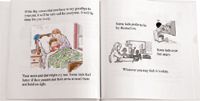Children's book puts euthanasia woes to rest
Veterinarian's end-of-life guide softens the sting of pet loss for pint-sized clients.
Monica Mansfield's friend was 40 years old before she found out the truth about her dog.
"Her pet that had supposedly 'gone off to the farm' when she was young was actually put to sleep when she wasn't home," says Mansfield, DVM, an associate at Medway Animal Hospital in Medway, Mass. "She was even an adult when she found out and she was still extremely wounded and angry."
This lack of euthanasia communication is not uncommon. However, Mansfield says the impact on children will be less traumatic if the parents are as honest as possible. That's why she wrote the children's book When You Have to Say Goodbye: Loving and Letting Go of Your Pet (Beanpole Books, 2011). The 32-page book, complete with thoughtful illustrations, helps parents find the right words to explain end-of-life issues to their sons and daughters. It's geared for children between 5 and 8 years old, but Mansfield would be lying if she said it didn't help adults, too. She says it's made many of her clients teary-eyed.

"We try not to be too technical but we use the correct terminology so there isn't confusion," Mansfield says. "We tell them what's happening in their language."
The book starts off by talking about the human-animal bond and fun times with a pet. (Your pet is always happy to see you. She never uses angry words. She listens to all of your secrets.) Then it eases into pet ailments. (If your pet becomes sick or hurt, you might feel sad or scared. Your family may need to bring your pet to the veterinarian, who is a special doctor just for animals.) And soon it gets into the much tougher stuff. (Sometimes when an animal is very sick, very old, or badly hurt, it might be time for her life to end. Your family might need to make a very difficult decision with the veterinarian's help.) Then the pages explain euthanasia—and Mansfield actually uses the "E" word.
"We try not to use the phrase 'put to sleep' because we don't want the child to ever feel like going to sleep is a bad thing," Mansfield says.

"The illustrator, Lennie Peterson, is a friend of mine who is a professional artist and cartoonist," Dr. Mansfield says. "He knows me so wellÂ-and heâs an animal lover-so he could represent the compassion and love throughout the book."
In the book she writes, "The veterinarian will give your pet a special medicine that will help her die peacefully and quickly so she will no longer feel bad or feel pain. It will be the kindest and most loving thing to do. This is called euthanasia. It doesn't hurt the animal and will help her die gently." The story wraps up with ways for children to cope (e.g., plant a flower in your pet's memory, draw a picture of your pet and frame it) and has a spot reserved on the last page for a photo of the beloved pet.
"If we know that clients are in the moment—they're either considering euthanasia or just made the decision—we ask, 'Are there young children at home?'" Mansfield says. "If they say yes, then we hand them a book."
Medway Animal Hospital increased the total price of euthanasia by $5, which more than covers the cost of one book (which retails for $8.95). That way every euthanasia client can take home a copy and help the whole family deal with pet loss.
"All of us deal with grief in our lives," Mansfield says. "If parents teach their children through their pet loss, which is often their first loss, then grief can be part of life. We can teach them how to get it through it."
Take a look at the book
Do you think your clients would appreciate this children’s guide to euthanasia? When You Have to Say Goodbye (Beanpole, 2011) retails for $8.95 but veterinarians can snag a 50 percent discount. Contact Bella Distribution for more information:
Phone: 800-729-4992e-mail: orders@belladist.comVisit the official website to learn more.
About the author
Monica Mansfield, DVM, an associate at Medway Animal Hospital in Medway, Mass., may never have written When You Have to Say Goodbye if not for her client Second Lieutenant Ian Thomas McVey. McVey was very in tune with animals and knew of Mansfield's other book, a memoir about life in veterinary practice called The Black Panties: Tales of Animal Mischief and Veterinary Intrigue (Beanpole, 2006). Lt. McVey encouraged Mansfield to write a book on euthanasia for children and his timing couldn't have been more perfect.

Monica Mansfield
"Just that week a family had asked me to explain the loss of their golden retriever to their 8-year-old child," Mansfield says. "I thought, 'Boy, if we had this written down somewhere it would be really helpful.'"
Lt. McVey died in military service just months after suggesting the idea and is honored in the book's foreword.